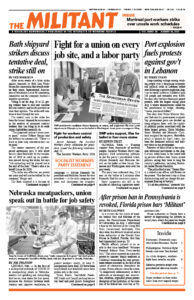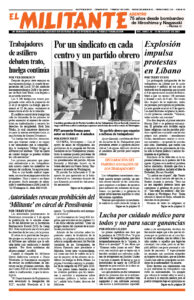Long-standing outrage among working people over a deepening economic and political crisis in Lebanon boiled over following a massive explosion Aug. 4 on the docks in Beirut. It killed at least 158 people and wounded over 6,000. For days after the blast thousands joined protests, with the largest taking place Aug. 8 where demonstrators called for the government to resign, chanting, “Leave, you are all killers.”
Two days later Prime Minister Hassan Diab and his government resigned. Top government posts are divided up along religious lines, with the capitalist political parties associated with the three largest groups, Shiite Muslims, Sunni Muslims and Maronite Christians assigned the top posts. Hezbollah, which is backed by Iran’s rulers, has been the dominant political and military force in the government.
Relatives of those killed in the explosion addressed participants in the Aug. 8 action, while many in the crowd held up pictures of those slain. Some carried gallows, saying they were to hang the country’s politicians, including Hezbollah leader Hassan Nasrallah.
“The police fired at me,” Younis Flayti, a retired army officer, told Reuters at the protest. “But that won’t stop us from demonstrating until we change the government from top to bottom.”
“It’s all the politicians,” protester Shadi Alame told the Washington Post. “They are stealing everyone’s money, stealing people’s rights.”
Triggered at first by the government’s imposition of a tax hike last year, people of all faiths have joined protests for months. Demands raised by demonstrators have widened to include jobs, relief from rising hardship, an end to Tehran’s interference in the country and for the fall of the government.
Hezbollah-organized thugs have been at the forefront of brutal assaults on protesters but failed to deter thousands from joining the actions, including from Shiite areas.
Some 2,750 metric tons of highly explosive ammonium nitrate, stored unsecured at the port of Beirut for over six years, blew up near densely populated areas of the city. The blast gutted neighborhoods, forcing up to 250,000 from their homes. The entire port was destroyed, along with the country’s main wheat silos.
Customs officials say that since 2014 they have written six times to the government asking how to dispose of the volatile material. They never got a reply.
Hezbollah has utilized the Beirut port to receive weapon shipments from its sponsor in Tehran. It bases missiles that target Israel in population centers across southern Lebanon, claiming this protects the largely Shiite population there. On Aug. 7 Nasrallah threatened that anyone blaming Hezbollah for the explosion would “start a battle” that only he would win.
The capitalist regime in Iran has fought over decades to extend its counterrevolutionary influence across the region. One of its main tools has been Hezbollah, which it arms and helps finance. Tehran claims to defend the interests of Shiite Muslims, but in fact the regime advances the Iranian capitalist rulers’ predatory interests against rival Arab regimes and Israel.
Hezbollah and Tehran-organized militias intervened in neighboring Syria to help save the dictatorial regime of Bashar al-Assad after a popular uprising for political rights and a subsequent civil war threatened to topple his rule. Tehran’s gains in Syria, coupled with its influence in the governments of Iraq and Lebanon, give the Iranian rulers land access to much of the Middle East and missile emplacements aimed at Israel.
The Israel Defense Forces had carried out airstrikes on Syrian military bases where Hezbollah units operate just a day before the Beirut explosion.
Deepening political crisis in Lebanon
Following the collapse of the Lebanese currency on money markets in May, working people have had the value of their wages slashed as prices soared. Inflation stood at 20% in June. Growing numbers face hunger, recurrent power outages and a daily battle to survive.
The crisis in Lebanon takes place in a region roiled by conflicts between Tehran, Ankara, Riyadh and other competing capitalist governments from Washington to Moscow seeking economic, political and military advantage. Emmanuel Macron, the president of France — the former colonial power in Lebanon — visited Beirut Aug. 6 pledging aid and a road to reinforce French influence.
“We don’t want any government to help us,” Mahmoud Rifai, who is unemployed, told Reuters at the Aug. 8 protest. “The money will just go into the pockets of our leaders.”

